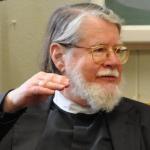God speaks worlds into existence, worlds that do not have the capacity to respond before the Word is spoken.
Jesus calls dead Lazarus from the tomb, a Lazarus who has lost the capacity to hear and obey.
Creative speech confers the capacity to hear and respond.
This seems to be a uniquely divine power; it’s a sign of the unique creativity of God.
But men and women too can speak in a way that confers the capacity to respond.
One might say: Bad rhetoric is speech that inhibits the capacity of the hearer to respond; good rhetoric facilitates a positive response from the hearer.
Good rhetoric is creative. It is human speech that conveys the capacity for response.
Think of a rousing pep talk, an effective political speech or sermon, a word of refreshment to one in pain or grief. These are human words that convey the power to act in new ways.
This is not mere analogy, much less a distant analogy. We have a capacity for creative speech because we’re made in the image of a God whose speech confers and conveys the power of response.
If it’s analogy, it’s an ontological analogy.












